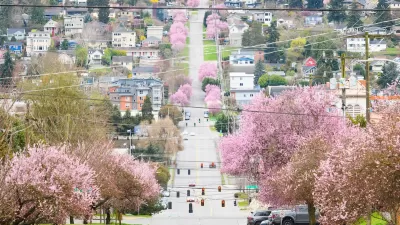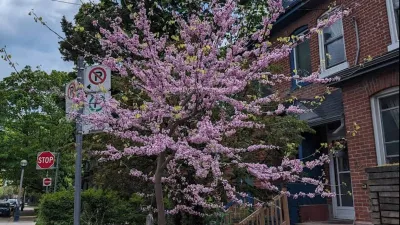Cities like Seattle and Bellingham are working to increase housing density while also preserving urban trees and green spaces.

After Washington state passed sweeping zoning reforms to encourage more ‘missing middle’ and multifamily housing production, prompting new questions about sustainability and the conservation of the urban tree canopy, “Cities in Washington are working to give those trees more importance in their planning considerations, centering urban forestry in their community strategies,” writes Clifford Heberden in The Urbanist.
According to Brennon Staley, Strategic Advisor for the Seattle’s Office and Planning and Community Development, “development in dense places like Seattle prevents further sprawl on the fringes, preserving more land and natural resources from development.” Seattle also signed on to the Tree Equity Collaborative, “a statewide partnership to achieve tree equity across the Evergreen State by expanding and fortifying neighborhood tree canopy cover.” If passed by the city council, the updated Urban Forest Protection Ordinance would require street trees with new residential developments and create new protections for existing trees.
In Bellingham, the city is working to balance the need for new housing with conservation with a new Urban Forestry Management Plan, slated for completion this summer. “Bellingham touts 40% tree cover within city limits, representing 7,252 acres of the diverse canopy. The goal is to maintain that percentage across the city.” Bellingham touts the benefits of its ‘urban villages,’ areas that encourage compact development and help preserve outlying green spaces. “Permit data as of March 2022 indicates a total of 2,800 housing units were added in Urban Villages, representing 40% of all new housing in Bellingham since 2006.”
FULL STORY: Bellingham and Seattle Balance Urban Forestry with Housing Needs

Alabama: Trump Terminates Settlements for Black Communities Harmed By Raw Sewage
Trump deemed the landmark civil rights agreement “illegal DEI and environmental justice policy.”

Study: Maui’s Plan to Convert Vacation Rentals to Long-Term Housing Could Cause Nearly $1 Billion Economic Loss
The plan would reduce visitor accommodation by 25% resulting in 1,900 jobs lost.

Planetizen Federal Action Tracker
A weekly monitor of how Trump’s orders and actions are impacting planners and planning in America.

Wind Energy on the Rise Despite Federal Policy Reversal
The Trump administration is revoking federal support for renewable energy, but demand for new projects continues unabated.

Passengers Flock to Caltrain After Electrification
The new electric trains are running faster and more reliably, leading to strong ridership growth on the Bay Area rail system.

Texas Churches Rally Behind ‘Yes in God’s Back Yard’ Legislation
Religious leaders want the state to reduce zoning regulations to streamline leasing church-owned land to housing developers.
Urban Design for Planners 1: Software Tools
This six-course series explores essential urban design concepts using open source software and equips planners with the tools they need to participate fully in the urban design process.
Planning for Universal Design
Learn the tools for implementing Universal Design in planning regulations.
Caltrans
Smith Gee Studio
Institute for Housing and Urban Development Studies (IHS)
City of Grandview
Harvard GSD Executive Education
Toledo-Lucas County Plan Commissions
Salt Lake City
NYU Wagner Graduate School of Public Service





























